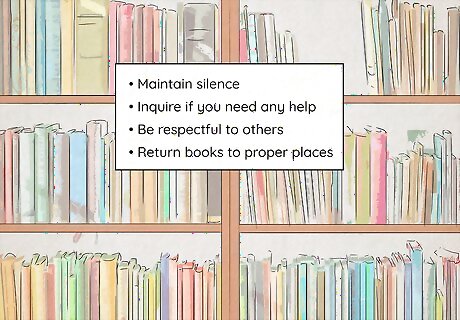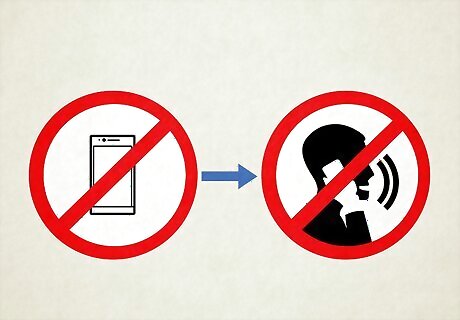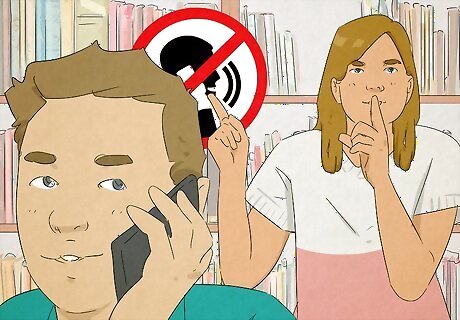
views
Make a positive first impression.

Gain respect for your authority with enthusiasm and helpfulness. Smile and greet patrons kindly (but in an appropriate “library voice”) when they walk in, then ask if there is anything you can help them with. While enforcing the library rules is an important part of your job, make it clear that your primary responsibility is to help every visitor have a positive library experience. And let them see that you enjoy what you do! Make it clear that you’re approachable and not intimidating. That way, patrons may seek you out before problems arise.
Post the rules for all to see.

Make the code of conduct easy to find so it’s easier to follow. Prevent anyone from being able to legitimately say “But I didn’t know that was against the rules!” Post the rules prominently in the library and make them easy to find on the website. If it’s a school library, go over the rules the first time you meet with each class or group of students. For example, after greeting a visitor and asking if they need any assistance, you might say: “Are you a first-timer at our library? If so, please take a look at the library rules posted right here and please feel free to ask me any questions.” Never just assume that patrons know not to eat in the library, talk too loud, write in the books, and so on.
Change outdated rules if you can.

Do your part to update rules so they make sense to follow today. Libraries can’t be stuck in the past and need to change with the times—without, that is, losing what makes them special. For example, a blanket “no cell phone” policy may have made sense 20 years ago, but it may be better replaced with a “no loud talking on your phone” rule today. Go over the code of conduct regularly and make reasonable changes (if you have that power) or suggest changes to those with rule-making power. While you can and should work to make the rules as fair, timely, and reasonable as possible, it’s still important that you enforce the rules that currently exist. Don’t just ignore a clearly-posted rule because you think it’s outdated or silly.
Accept and express your authority.

Take your responsibilities seriously without being an authoritarian. Establishing your authority doesn’t mean walking around with your arms crossed and a scowl on your face, or aggressively “shhh”ing like you might see in a movie. Instead, use your words and actions to demonstrate that you accept the responsibility of your position as a librarian. Once you make sure everyone knows the rules, make it equally clear that you’ll ensure they’re followed. For instance, you might tell a group of students the following: “Librarians are helpers, and my job is to help every library visitor get the most out of their experience here. That means I have to stop any disruptive behavior that bothers other library visitors.”
Stop problems before they start.

Act proactively and positively instead of reacting too late. If, for instance, you anticipate that a visiting group of young kids is going to be a disruption to the other library patrons, don’t wait for problems to arise and then respond to them. Instead, engage with the group right from the start and find ways to keep them occupied in non-disruptive ways. You might lead an impromptu story time in the kids’ section of the library, for instance, or pass out activity sheets.
Enforce the rules fairly.

Treat patrons equitably so you can maintain your authority. You can’t hope to have your authority respected if you enforce the library’s code of conduct unevenly. Make it clear that the rules are the rules and that everyone has to follow them. While it’s true that no two situations are ever the same, do your best to approach disruptions and rule-breaking in a consistent manner and to dole out equitable consequences. If your library has a “three strikes and you’re out” policy for disruptions, don’t give one patron more leeway than another when the circumstances are similar. For instance, you might approach disruptions by a 5-year old and a 15-year old somewhat differently, but don’t treat two teenagers who are causing similar disruptions differently.
Give clear warnings.

Offer a chance for improvement and state the consequences. Respond calmly, positively, and immediately when you see a violation of the library’s rules happening. Engage with the person causing the problem, identify what they’re doing that’s against the rules, offer a positive solution, and warn them what will have to happen if the problem continues. Be a helper and a problem-solver. For example, you might say the following: “I’m sorry, but food and drink is not allowed in this area because we’re worried about possible damage and distractions. I’ll reserve this computer so you can have your snack on the patio and then come right back to it. Otherwise you’ll have to put the snack away.”
Team up with other staff.

Confront repeat rulebreakers with a second librarian when possible. Teaming up with another librarian increases your authority and offers moral support. It also offers protection from allegations by the rule breaker—for instance, that you targeted them unfairly or acted inappropriately. That said, don’t avoid maintaining discipline just because you don’t have a “wingman” available to assist you, unless that’s the stated policy of your library.
Follow up on your warnings.

Enforce the consequences you stated if the problem continues. It’s usually pretty easy to tell a disruptive patron what the consequences will be, but often much more difficult to actually follow through on them. Nobody likes to be the “bad guy,” but remember that your job is to ensure that all the other library visitors can have a positive experience. You’ll also lose any authority and respect you’ve earned if you don’t follow through. If you told a patron they’d have to leave if they continued to talk loudly on their phone and bother other patrons, do exactly that: “I’m sorry, sir, but you’ve been clearly warned twice about this and told that you’d have to leave if it continued. For the sake of the other people in the library I must tell you to leave the library and stay away for the rest of the day.”
Call security for emergencies.

Get help if a person is a threat to themselves, you, or others. Follow your library’s security protocols when a potentially dangerous situation arises. For example, if a disgruntled patron threatens you in any way, take it seriously and immediately contact security or the police. Don’t risk your own safety in order to maintain library discipline.














Comments
0 comment